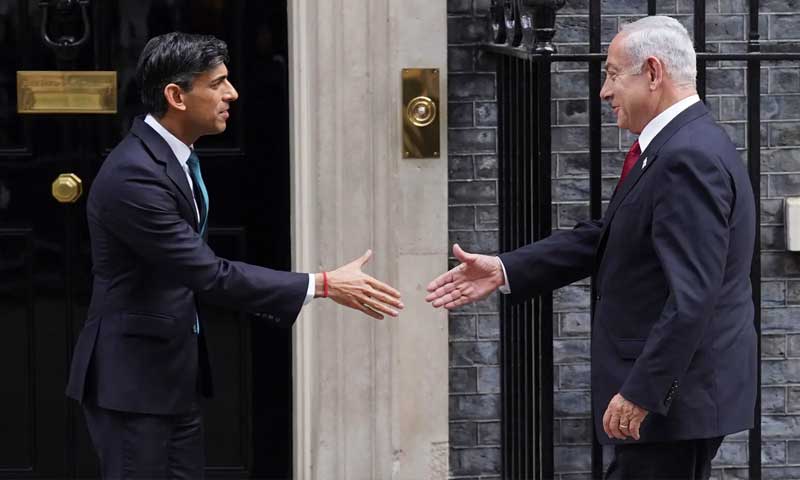
By the end of this week, Prime Minister Keir Starmer is expected to drop the previous government’s objections to the International Criminal Court prosecutor’s pursuit of an arrest warrant for Prime Minister Benjamin Netanyahu of Israel, two people briefed on the government’s deliberations said. The two people spoke on the condition of anonymity given the political sensitivities of the issue.
Last week, Britain said it would restart funding for the main United Nations’ agency that aids Palestinians, UNRWA, having concluded that the agency had taken steps to ensure that it meets “the highest standards of neutrality.” The Israeli government had accused a dozen of the agency’s employees of playing a role in the Hamas-led Oct. 7 attacks on Israel or their aftermath.
Taken together, these steps show a government that is willing to pile more pressure on Mr. Netanyahu for Israel’s harsh military response in Gaza. It also shows that Mr. Starmer, a former human rights lawyer, is paying more heed to international legal institutions than the United States.
In May, President Biden condemned as “outrageous” the International Criminal Court prosecutor’s effort to obtain arrest warrants for Mr. Netanyahu and the Israeli defense minister, Yoav Gallant. Although the warrants would be largely symbolic measures, the Republican-controlled House of Representatives voted to pass legislation imposing sanctions on court officials.
Analysts noted that Britain’s new government had not imposed concrete measures like halting weapons shipments to Israel. Officials have said they are awaiting the results of a legal review of whether Israel is violating human rights laws.
These early moves suggest that the prime minister, who is the author of a book on European human rights law, is charting his own course on a conflict that has vexed Western leaders, including Mr. Biden, President Emmanuel Macron of France and Chancellor Olaf Scholz of Germany. Britain’s close alignment with the United States had caused the Labour Party headaches with many of its own supporters, who agitated for a swifter British call for an immediate cease-fire in Gaza.
“Starmer can say, ‘Judge me by what I’m doing. These are the two early decisions I made. How can you criticize those?’” said Daniel Levy, who runs the U.S./Middle East Project, a research organization based in London and New York.
Mr. Starmer has appointed Richard Hermer, a prominent human rights lawyer and close former colleague, as attorney general. Mr. Hermer will be highly influential in advising the prime minister on Israel, signing off on any legal intervention submitted to the International Criminal Court.
Born into a Jewish family and a supporter of Jewish causes, Mr. Hermer advised the Labour Party to oppose the previous government’s effort to pass a law banning local authorities in Britain from boycotting Israeli-affiliated entities. He argued that it would infringe on their free speech.
“He’s an acknowledged expert of huge standing and reputation in human rights law,” said Colm O’Cinneide, professor of constitutional and human rights law at University College London.
While the government has not said how it plans to respond to the International Criminal Court, Mr. Starmer said in May: “The court should be able to come to its decision in due course. I support the court and I support international law.” Rishi Sunak, his predecessor, called the pursuit of arrest warrants for Mr. Netanyahu and Mr. Gallant “deeply unhelpful.”
But Zaki Sarraf, a legal officer for the International Center of Justice for Palestinians, a group that supports the rights of Palestinians, called on the government to take a clear position.
“There can’t be a pick-and-choose approach to this sort of thing,” Mr. Sarraf said in a statement, noting that Mr. Starmer praised the court when it sought an arrest warrant for President Vladimir V. Putin of Russia. “International law must be applied without fear or favor, and he must support these arrest warrants, too.”
The war in Gaza has put Mr. Starmer and the Labour Party into a tricky political position from the start. Mr. Starmer did not want to show daylight with the Conservative government on a major national security issue before the general election. He had also successfully cleansed Labour of a reputation for antisemitism in parts of its rank-and-file membership under the previous leader, Jeremy Corbyn, who was purged from the party over the issue.
Mr. Starmer initially backed the government’s staunch support of Israel, along with a call for increased humanitarian aid to civilians in Gaza. He later called for an immediate cease-fire, as did the government, but not soon enough to satisfy people on his party’s left or many Muslim Labour supporters.
Labour’s careful balancing act did not spare the party a backlash at the polls, even in an election in which it won a landslide victory. Jonathan Ashworth, a Labour figure who would probably have been named to a cabinet post, unexpectedly lost his seat to a pro-Palestinian activist.
Mr. Starmer himself won a reduced share of the vote in his North London seat compared with the 2019 election, in part because of a challenge by an independent who voiced anger with Labour’s stance on Israel.




